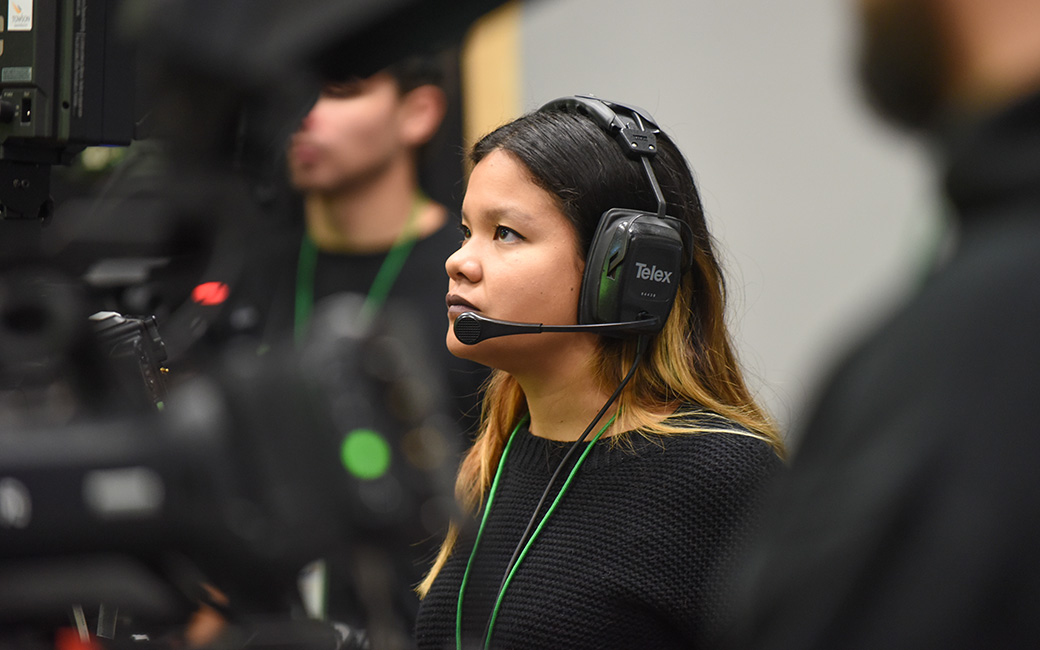Career & Internship Support
Internships afford students the opportunity for professional experiences and networking, and are viewed as an integral part of the Electronic Media and Film major.

Electronic Media and Film has a very active internship program. Our majors have served as interns with local and national organizations including: CNN, Academy of Television Arts and Sciences, The Discovery Channel, The Learning Channel, network television stations in Baltimore and Washington, D.C., Hollywood feature films, Hearst radio stations such as WBAL, 98 Rock, and Viacom, Maryland Film Commission, American Film Institute, Maryland Public Television, BET and Warner Brothers. Our students have also been media interns for both the Baltimore Ravens and Baltimore Orioles as well as TU Athletics.
Part of the requirement to receive college credit for your internship is that you are able to express its impact on your academic and career choices. These written requirements combined with the required forms serve this purpose. Below are the guidelines and required forms for EMF Internships.
Eligibility
Full EMF Majors with at least 60 credits completed (Junior status).
Completion of courses related to the area of internship concentration:
- EMF 140 and EMF 222 prior to any video or television placement
- EMF 221 and EMF 222 prior to any film placement
- EMF 140 and EMF 265 prior to any radio placement
- Cumulative GPA requirement: 2.75 overall, 3.00 in the major. Waivers are considered by the department.
Finding and Registering for an EMF Internship
Find an Internship that will work with your schedule – preferably the semester before you plan to Intern. Check out these resources:
We host a private, moderated EMF Crew Call LinkedIn Group, which is open to both current students and alumni to post crew and casting calls,
job opportunities, film festival deadlines, grants and fellowships, and other relevant
announcements. We encourage students to join now and to continue to utilize and contribute
to it once they become alumni.
EMF Google ListServ is an e-mail list you can sign up for to receive postings as a current student and
after you graduate. All posts are archived for you to browse:
The Towson EMF Production Labs Blackboard Organization is another resource for our
students, including private discussion forums where students can post crew and casting
calls and other types of needs to other current students. Students can subscribe to
this discussion board to receive e-mail updates. This YouTube tutorial explains the
instructions to join the EMF Production Labs Blackboard.
Handshake is a free, online job and internship database that offers recruiting services exclusively
for students, alumni, employers, faculty and staff. It is an excellent repository
of digital media-related internships and job opportunities, as well as announcements
for on-campus job fairs, workshops, and networking events.
Signing Up and Required Forms
When you find an internship, ask any full-time EMF faculty member to be your Internship Sponsor. Turn in the required forms to that faculty member and they will have the department enroll you in their section of EMF 460. Remember that each faculty member is limited in how many Internships they can sponsor.
- Download the EMF Internship Forms as a PDF or DOCX.
- To start an Internship for credit, you’ll need to fill out and have your Faculty Internship Sponsor approve the first two forms: Internship Registration Form and the Learning Plan.
- The other required forms due at the end of the Internship are: Work Log, Mid-Semester Evaluation of Intern by Supervisor, End of Semester Evaluation of Intern by Supervisor, End of Semester Evaluation by Intern
Reflective Report
This written paper provides the means for you to reflect upon your work experience
and assess its relevance, the learning process, and the knowledge or skills that you
gain. The reflective report shall describe the student’s perceptions of the organization
and the work environment.
In the report, the student will:
- Describe a “typical” day or the tasks in which the student is involved
- Relate duties performed to prior courses, both in the major and in liberal arts (be specific)
- Describe new knowledge gained or skills learned
- Explain the portions of the work experience that were most and least valuable
- Relate the total internship experience to the career decision process. The student will address the expectations established in the introduction to the log and describe any aspects of the internship or co-op that could be improved.
- Include a copy or sample of any materials prepared by the student on the job (video or audio programs, letters, budgets, questionnaires, tapes, articles, press releases, etc...).
- Confidential material should not be included.
Although your work experience and performance comprise the major portion of your grade, the written requirements are given significant consideration. Written assignments will be graded on content, unity, and literacy.
The total report should be turned in to your Faculty Internship Sponsor by the due date established at your first meeting.
Grading and Credit Hours
Your internship experience is graded on a Satisfactory/Unsatisfactory (S/U) basis. It will appear on your transcript as EMF 460: Internship.
The formula for academic credit is:
40 hours over the course of the entire semester = 1 unit
A typical Internship of 8 hours per week over a fifteen week semester would equal
3 units.
If you have any questions about any parts of the written requirements, contact your Faculty Internship Sponsor.
For additional information, contact one of our EMF Internship Coordinators, Jena Burchick or Mark Burchick